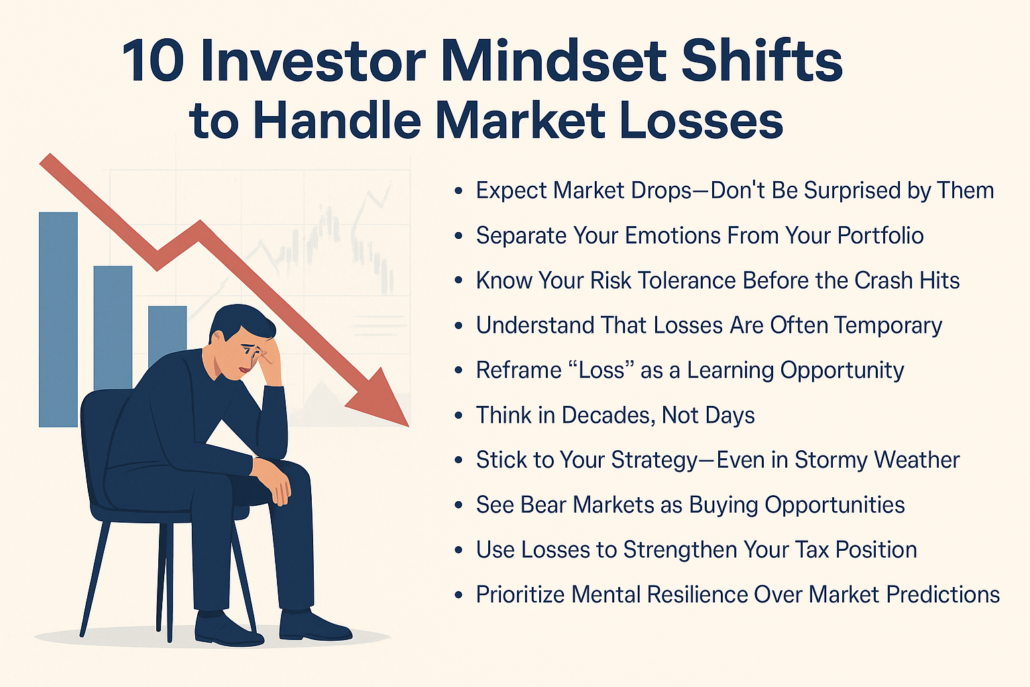10 Investor Mindset Shifts to Handle Market Losses
Market downturns test even the most disciplined investors. When portfolios shrink, fear takes over. But emotional investing mistakes rarely lead to long-term success.
The right investor mindset during a market crash helps you stay focused, minimize losses, and even uncover new opportunities.
Here are 10 shifts you can make to keep your investment strategy on track—no matter how volatile the market becomes.
1. Expect Market Drops—Don’t Be Surprised by Them
Market downturns aren’t rare—they’re part of the cycle.
-
Bear markets happen roughly every 3 to 5 years.
-
Even long bull runs include temporary corrections of 10% or more.
-
Historically, the market has always rebounded.
If you understand how to handle stock market losses before they occur, you’ll react with control, not fear.
2. Separate Your Emotions From Your Portfolio
You’re not your portfolio. But when you see red, it feels personal.
That panic comes from a biological response—your brain is trying to protect you. But selling at the bottom is one of the most common emotional investing mistakes.
To stay calm:
-
Avoid checking your balance every day.
-
Review your long-term goals, not daily charts.
-
Talk to a financial advisor—not your emotions.
This mindset shift gives you an edge during volatility.
3. Know Your Risk Tolerance Before the Crash Hits
You shouldn’t be figuring out your tolerance for risk during a downturn.
Smart investors assess risk in calm times:
-
How much of a drop can you handle without panic-selling?
-
Are you too heavily weighted in equities?
-
Do you have 3–6 months of expenses in cash?
Doctor Tax Saving Strategies for 2025 can guide you through how to build a plan that limits risk and aligns with your future goals.
4. Understand That Losses Are Often Temporary
A 20% drop feels massive in the moment.
But most long-term investors see positive returns if they stay invested:
-
After the 2008 crash, the market doubled within 5 years.
-
Every major market downturn has eventually reversed.
Pulling out locks in losses. Staying in keeps the door open for gains.
Market Losses: Tax-Saving Opportunities breaks down how tax strategies for market losses can actually improve your financial position.
5. Reframe “Loss” as a Learning Opportunity
Instead of asking “How much did I lose?”, ask:
-
Did I have too much risk?
-
Did I follow a plan or react emotionally?
-
What would I do differently next time?
Don’t Fear Market Losses—Learn from Them offers a helpful framework.
Learning from downturns sharpens your discipline and reduces emotional errors.
6. Think in Decades, Not Days
Zoom out.
A market dip over one year looks like a blip over twenty.
Use this mindset:
-
Retirement is likely 10–30 years away.
-
You’re not investing for this quarter—you’re investing for your future.
-
The best gains often follow the worst declines.
For long-term planning, review the IRS guide to Roth IRAs and Traditional IRAs and their required minimum distributions (RMDs).
How to Create a Tax-Free Retirement explains how this long view helps you build wealth and reduce taxes.
7. Stick to Your Strategy—Even in Stormy Weather
Market drops tempt you to rewrite your plan.
Don’t.
Your asset allocation was designed with downturns in mind. Shifting to “safe” investments at the wrong time is one of the worst panic selling tips you can follow.
Instead:
-
Rebalance, don’t retreat.
-
Stay consistent with contributions.
-
Avoid “timing the bottom.”
See the IRS 401(k) resource guide for how staying invested in tax-advantaged accounts supports long-term gains.
8. See Bear Markets as Buying Opportunities
The only thing that’s changed is price. Quality companies are still quality companies.
Downturns can be ideal for:
-
Buying discounted assets
-
Accelerating contributions
-
Executing a Roth conversion during a market dip
For physicians and contractors, the 1099 Contractor Tax Guide shows how to align tax savings with long-term investing moves.
9. Use Losses to Strengthen Your Tax Position
Losses can be a tool, not a setback.
You can:
-
Offset gains through tax-loss harvesting
-
Carry unused losses forward
-
Optimize conversions to Roth accounts
Visit the IRS to review capital loss deduction rules, IRA contribution limits, and RMD FAQs.
Best Tax Structure for Doctors in 2025 explains how structuring your practice or income can amplify those benefits.
10. Prioritize Mental Resilience Over Market Predictions
You don’t control the market—but you do control your mindset.
Instead of reacting to noise:
-
Stick to your personal financial goals
-
Limit your exposure to constant market news
-
Practice mindfulness or exercise to reduce anxiety
Need help calming your mind? See Tips for Post-Tax Season Stress Relief.
Your brain—not your balance—is your best asset in market downturns.

10 essential mindset shifts to help investors stay calm, focused, and strategic during market downturns.
FAQ: Handling Market Losses with Confidence
Why do I panic when the stock market drops?
Because loss triggers your brain’s fight-or-flight response. It’s instinctive—but not helpful for long-term investing.
How should I mentally handle losing money in the market?
Focus on long-term goals. Stick to a plan. Avoid emotional investing mistakes that derail your progress.
What mindset helps investors survive a market downturn?
One that accepts risk, avoids panic selling, and sticks to a diversified long-term strategy.
How can I stop making emotional decisions with my investments?
Use automation, pre-set rules, and work with a planner to stay grounded—especially during volatility.
What do experienced investors do differently during bear markets?
They apply tax strategies for market losses, rebalance portfolios, and avoid rash decisions.
How do I stay calm and focused when my portfolio is down?
Limit media exposure, revisit your investment policy, and focus on what you can control.
Is it normal to feel anxious during market crashes?
Yes. But your actions—not your feelings—shape your results.
Should I change my investment plan when the market drops?
No—unless your timeline or goals change. Knee-jerk changes often lead to bigger losses.
What long-term strategies help avoid panic selling?
Diversification, recurring contributions, and understanding the investor mindset during market crash cycles.
How can I use tax planning to improve outcomes during market losses?
By executing a Roth conversion during a market dip, harvesting losses, and using the right tax structure, you can improve your position over time.
Visit contact physiciantaxsolutions.com to schedule a consultation and learn how we can help you take control of your tax strategy today.
This post serves solely for informational purposes and should not be construed as legal, business, or tax advice. Individuals should seek guidance from their attorney, business advisor, or tax advisor regarding the matters discussed herein. physiciantaxsolutions.com assumes no responsibility for actions taken based on the information provided in this post.
